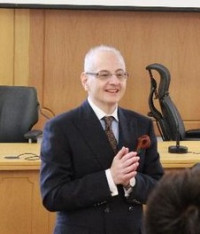How leaders can improve employee and stakeholder wellbeing in the post Covid-19 world
09 June 2021

Jonathan Fortnam is dean of Aston Law School and former partner at Pinsent Masons LLP, where his practice focused on corporate litigation, developing award-winning innovation in client relationships and the firm's approach to responsible business.

Stuart Weinstein is reader in legal risk management at Aston Law School, former general counsel at a global multinational and is contributing editor to Globe Law and Business’s series on legal risk management.
It is very important to stay aware of the challenges facing your employees and wider business network as a leader. When you are working with your team it is important to audit (or just ask) as part of the ‘check’ of ‘check, plan, do’.
It is very important to stay aware of the challenges facing your employees and wider business network as a leader. When you are working with your team it is important to audit (or just ask) as part of the ‘check’ of ‘check, plan, do’, say
- Being authentic increases your chance of getting honest answers; be aware that certain team members (not always the more junior) will say what they think you want to hear.
- Do not be satisfied with the first answer. Also, think about making an impromptu call to see how members of your team are doing. The chance conversation in the lift or the coffee queue will not happen in lockdown; you need to recreate it (without surprise – remember, they can’t see your face when you make the invitation).
- Be systematic about asking how your team are getting on and remember that the point of the call is not necessarily a social one. At our university, we instituted a concerted effort to speak with every staff member during lockdown (‘contactless contact’). Some conversations were less than we might have hoped for in terms of human warmth and humour. Nevertheless, that did not matter. When we surveyed the staff later in the summer, an overwhelming percentage said anonymously that they highly appreciated the support they had received. These calls are not ‘social’, in the sense that the aim is not to deepen friendships; instead, they are appropriate leadership actions to show that we care. Friendship and care are not the same! Good leaders care, full stop.
- Take time to check in with your stakeholders – the communities on which your legal team’s success depends:
- Think of their triple bottom line (but do not show off about it): ask about the issues facing their people, profit and ‘planet’.
- What have your stakeholders lost? How are they struggling? Your success depends on them (and their clients/customers); so do not just think about your legal team’s direct clients – think also about their clients/customers.
- Do not boast about caring: this is not a marketing strategy! It is part of being in business – an investment in a relationship that may not translate immediately into instructions and fees. Hang in there; wanting to be part of the solution rather than part of the problem (eg, by insisting on a fee) is significant in demonstrating and building trust. If you do not, there could be bigger challenges around the corner.
- Get on the front foot with your legal team, to remind them of the team’s purpose and strategy statements. These should serve as their ‘North Star’ – the principles that guide them through stormy seas as well as calm waters:
- How are the business and the teams that you lead and serve shaping up against their raison d’être ?
- If you are a general counsel, is there a need to speak truth to power to stay true to the purpose of your business? We believe in the value of a purpose (and research shows that purpose-led businesses perform better in the longer term than their competitors). So focus on your purpose and, if appropriate, encourage your team members to discover and follow theirs. This should not be a ‘programme’ or an ‘initiative’; those speak of a driven business. There is both need and opportunity for legal teams which are led in ways that afford individuals the space and permission to connect with the reason why.
- Be intentional and lead in ways that people want to (and do) follow. It may not be enough to wait for clients to dictate the innovation strategy. We are accustomed (even pre-conditioned) to following our clients’ lead; but let’s not substitute service for laziness or, more likely, an unhealthy excess of caution. At a time when many of the familiar aspects of professional life have been dismantled or sidelined, there is space and time for us all to remember why we are who we are: why we are lawyers; why we are in the team. Let’s rediscover the whys and discuss them. The COVID-19 dislocation might also allow for an honesty that familiarity can mask.23
- When other teams are focusing on consolidation, there may be opportunities for those that look outwards. There will certainly be some when the lockdowns are over – and better to have a rolling start than a standing start.
Jonathan Fortnam is dean of Aston Law School and former partner at Pinsent Masons LLP, where his practice focused on corporate litigation, developing award-winning innovation in client relationships and the firm's approach to responsible business.
Stuart Weinstein is reader in legal risk management at Aston Law School, former general counsel at a global multinational and is contributing editor to Globe Law and Business’s series on legal risk management.
They are the authors of Special Report Legal Practice Transformation Post-COVID-19













Any comments - send us an email